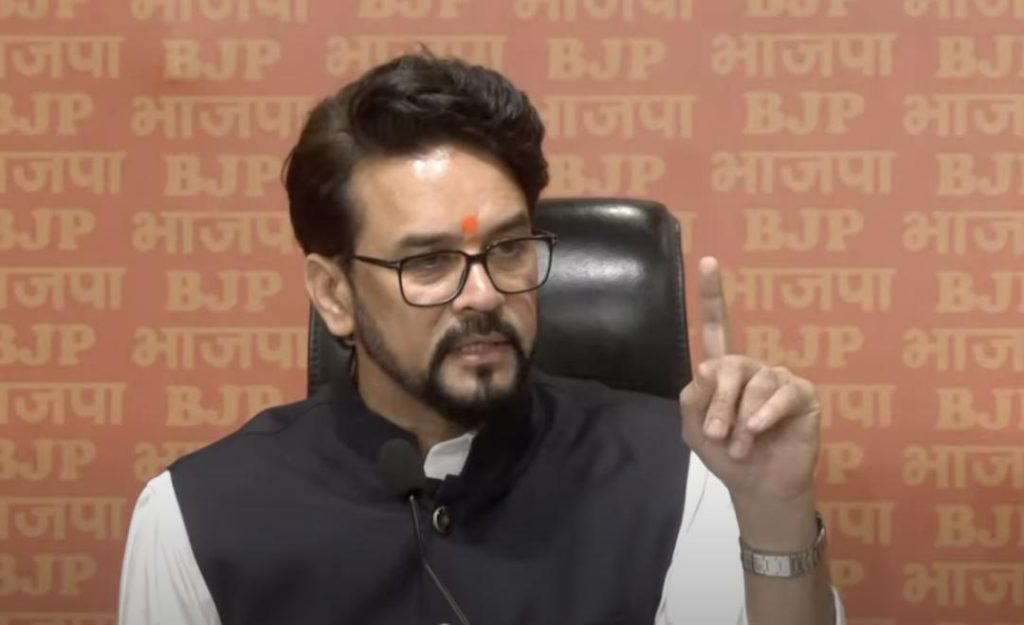
Congress & CPI made Bhimrao Ambedkar lose the poll in 1952: BJP
The year 1952 was a significant one in the history of Indian politics, as it marked the first general election after the country gained independence from British rule. The Indian National Congress, led by Jawaharlal Nehru, was the dominant force in the election, and it’s no surprise that they emerged victorious. However, what is often forgotten is the role played by the Communist Party of India (CPI) in the election, and how it contributed to the defeat of a stalwart leader like Dr. Bhimrao Ambedkar.
Recently, BJP MP Anurag Thakur made some startling revelations about the 1952 election, pointing out that the Congress and CPI conspired to defeat Dr. Ambedkar, a constitution maker and a Dalit leader. According to Thakur, the electoral corruption laid the foundation for future electoral malpractices in the country.
Speaking at an event, Thakur said, “Congress and CPI together defeated Dr. Bhimrao Ambedkar, a constitution maker and saint-like leader, in the election. 74,333 votes were rejected.” He added, “Congress ensured that a constitution maker, a Dalit leader, was eliminated in the very first election.”
Dr. Bhimrao Ambedkar was a towering figure in Indian politics, known for his tireless efforts to uplift the marginalized sections of society, particularly the Dalits. He played a key role in drafting the Indian Constitution and was a strong advocate for social justice and equality. Despite his many achievements, Ambedkar’s political career was marked by controversy and intrigue, and his defeat in the 1952 election was a significant setback for him.
The 1952 election was a major event in Indian politics, with the Congress emerging victorious in 364 out of 489 seats. The CPI, which was a significant force in the election, won 16 seats. However, what is often overlooked is the role played by the CPI in Ambedkar’s defeat.
According to Thakur, the CPI and Congress conspired to defeat Ambedkar by rejecting a significant number of votes. This was achieved through a combination of electoral malpractices, including booth capturing and rigging. The rejected votes, which totaled 74,333, were a significant proportion of the total votes cast in the election.
The defeat of Ambedkar in the 1952 election was a major blow to his political career. He had been a dominant force in Indian politics for many years, and his defeat was seen as a significant setback for the Dalit community. The election also marked the beginning of a new era of electoral politics in India, characterized by corruption and malpractices.
Thakur’s revelations about the 1952 election have sparked a fresh debate about the role played by the CPI and Congress in Ambedkar’s defeat. Many have called for an investigation into the allegations, and some have even demanded that the Congress and CPI apologize for their role in Ambedkar’s defeat.
The BJP has been quick to capitalize on the issue, with many party leaders making similar allegations about the Congress and CPI. The party has also accused the Congress of being responsible for the electoral corruption that has plagued Indian politics for decades.
The Congress, on the other hand, has rejected the allegations, with party leaders claiming that they have no knowledge of any electoral malpractices in the 1952 election. The CPI has also denied any involvement in Ambedkar’s defeat, saying that it was a democratic election and that the results were a reflection of the people’s will.
Regardless of who is responsible, the defeat of Dr. Bhimrao Ambedkar in the 1952 election is a significant reminder of the challenges faced by the Dalit community in Indian politics. The election marked a turning point in Ambedkar’s career, and his defeat had far-reaching consequences for the Dalit movement in India.
In conclusion, the 1952 election was a significant event in Indian politics, marked by controversy and intrigue. The defeat of Dr. Bhimrao Ambedkar at the hands of the Congress and CPI is a reminder of the challenges faced by the Dalit community in Indian politics. The BJP’s allegations of electoral corruption in the election are a timely reminder of the need for electoral reforms in India. As the country prepares for the next general election, it is essential that we learn from the past and work towards creating a more inclusive and democratic electoral system.
Source: https://youtu.be/0kLyW5rSJSg






